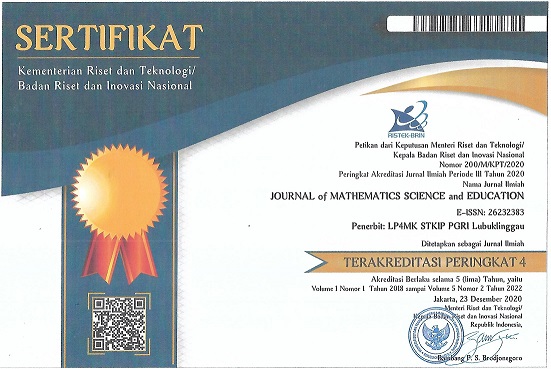SYSTEMATIC LITERATURE REVIEW: PEMBELAJARAN SUDUT MENGGUNAKAN PENDEKATAN PENDIDIKAN MATEMATIKA REALISTIK
Abstract
This research aims to conduct a literary review regarding corner learning using Indonesian Realistic Mathematics Education (PMRI). The method used is Systematic Literature Review (SLR). The data in this research is information on learning angles using (PMRI) taken from selected articles. The articles used as data sources in this research are 6 articles with the criteria being (1) the content being taught is about angles, (2) using the PMRI approach, (3) using the design research method, (4) the articles come from reputable and indexed journals. Sinta and Scopus. Based on the results of the study, it was found that (1) the initial problem in the research was students' misconceptions about the concept of angles, (2) the use of the PMRI context can bridge students in understanding the context of angles, (3) learning activities produce local instructional theory (LIT), (4) research results state that learning becomes more meaningful because students learn from real situations.
References
Apriani, F., Cahyani., P.A. (2019). Museum Timah Indonesia Pangkalpinang Sebagai Alternatif Pembelajaran Materi Sudut. AKSIOMA: Jurnal Program Studi Pendidikan Matematika ISSN 2089-8703 (Print) 8(3), 395-407. ISSN 2442-5419 (Online) DOI: https://doi.org/10.24127/ajpm.v8i3.2276
Bustang, Zulkardi, Darmawijoyo, Dolk, M., & Van Erde, D. (2013). Developing a local instruction theory for learning the concept of angle through visual field activities and spatial representations. International Education Studies, 6(8), 58-70.
Butuner, S.O., & Filiz. (2016). Exploring high-achieving sixth grade students’ erroneous answers and misconceptions on the angle concept. International Journal of Mathematical Education in Science and Technology. Queens University. https://doi.org/10.1080/0020739X.2016.1256444
Calderón, A., Ruiz, M. (2015). A Systematic Literature Review on Serious Games Evaluation: An Application to Software Project Management. Computers & Education, 87, 396-422. https://doi.org/10.1016/j.compedu.2015.07.011
Cromton, H. (2015). Understanding Angle and Angle Measure: A Design-Based Research Study Using Context Aware Ubiquitous Learning. International Journal for Technology in Mathematics Education, 22(1), 19-30. doi:10.1564/tme_v22.1.02
Fruedenthal. (2002). Revisiting mathematics education. China lectures. Dordrecht: Kluwer.
Gravemeijer, K. (2004). Learning trajectories and local instruction theories as means support for teachers in reform mathematics education. Mathematical Thinking and Learning, 6(2), 105-128.
Mitchelmore, M., & White, P. (2000). Development of angle concepts by progressive abstraction and generalization. Educational Studies in Mathematics, 41, 209-238. http://dx.doi.org/10.1023/A:1003927811079
Ramadhani, Rully C., & Prahmana. (2019). Desain Pembelajaran Garis Dan Sudut Menggunakan Jam Dinding Lingkaran Untuk Siswa Smp Kelas VII. Jurnal Review Pembelajaran Matematika. 4(2) 85-101.
Sa’adah, N., Arghob, K.H., Nur, P,.M. (2021). Etnomatematika Gerakan Tari Kretek Kudus Pada Pembelajaran Matematika. E-ISSN 2654-9948 ALGORITMA Journal of Mathematics Education (AJME). 3 (1), 58-71. http://journal.uinjkt.ac.id/index.php/algoritma
Sembiring, R.K. (2010). Pendidikan Matematik Realistik Indonesia (PMRI): Development and challenges [in Bahasa]. Journal on Mathematics Education, 1(1), 11-16. https://doi.org/10.22342/jme.1.1.791.11-16.
Widyawati, W., Putri. R.I.I., & Somakim. (2016). Desain Pembelajaran Sudut Menggunakan Konteks Rumah Limas Di Kelas VII. JINoP (Jurnal Inovasi Pembelajaran., 2 (2), ISSN 2443-1591 E-ISSN 2460-0873
Zawacki-richter, O., Kerres. M., Bedenlier, S., Bond, M., & Buntins, K. (2020). Systematic Reviews in Educational Research: Methodology, Perspectives and Application. Wiesbaden: Springer VS. https://doi.org/10.1007/978-3-658-27602-7
Zulkardi, & Putri, R. I. (2010). Pengembangan Blog Support untuk Membantu Siswa dan Guru Matematika Indonesia Belajar Pendidikan Matematika Realistik Indonesia. Jurnal Inovasi Perekayasa Pendidikan (JIPP). 2(1), 1 – 24

This work is licensed under a Creative Commons Attribution-NonCommercial-ShareAlike 4.0 International License.

This work by Journal of Mathematics Science and Education is licensed under a Creative Commons Attribution-NonCommercial-ShareAlike 4.0 International License.

















